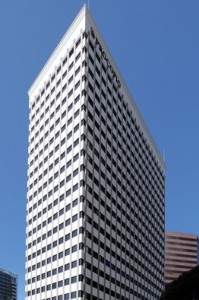City-Appointed Panel Picked Cassidy Turley to Renegotiate Leases, but New Mayor Gave the Job to a Local Broker
By Molly Hensley-Clancy
Nearly a decade after a fiscal crisis earned the city of San Diego the tagline “Enron by the Sea,” America’s eighth-largest city has yet to shake the nickname—or the budget woes.
So when Jason Hughes offered to perform for free a service that would normally have set the cash-strapped city back about a million dollars, it seemed like a deal San Diego couldn’t afford to pass up. Leases on 550,000 square feet of the city’s office space were set to expire, and Mr. Hughes, a local real-estate consultant, offered to renegotiate the leases free of charge with the city’s landlords.

That was in 2009. But instead of taking the deal, the city spent more than four years embroiled in a feud over whether it could—or should—accept a free service and whether a competing bid from rival real-estate broker Cassidy Turley, which offered discounted fees of about $500,000 to renegotiate the city’s leases, was a better deal for the city.
A panel appointed by the city eventually named Cassidy Turley the winning bidder. But new mayor, Bob Filner, a Democrat who took office in December, overruled the panel and in April gave the job to Mr. Hughes. On Monday, the city council voted to approve the first of the leases Mr. Hughes negotiated, which the mayor said will save the city $15.7 million over six years.
Renegotiating office leases can be a drawn-out process even in the best of circumstances. But the saga in San Diego shows how badly bogged down the process can get when politics and personal agendas get involved.
Mr. Filner says the process was an example of the city’s history of awarding contracts based on personal alliances. “It was all political, not based on rational economics. Jason [Hughes] and I broke that circle up.”

Cassidy Turley sees it differently. Dan Broderick, president of the company’s San Diego office, says that overriding the panel’s decision and awarding Mr. Hughes the bid is itself an example of political favoritism on the part of Mr. Filner. “It was a politically charged appointment,” Mr. Broderick said.
It all began in 2009, when the city of San Diego proposed building a new “money-saving” city hall. That proposal used what Mr. Hughes, a well-connected local real-estate broker, believed were drastically inflated estimates for renegotiating the city’s leases to make it appear that building was more cost-efficient for the city than leasing. Mr. Hughes is president of Hughes Marino Inc.
The firm that conducted the analysis, Jones Lang LaSalle, JLL +2.09% put the cost of renegotiating at $2.17 a square foot per month, according to Mr. Hughes. He said he argued that given San Diego’s slumping downtown real estate, he could get the cost down to less than $1.50 a square foot, making the supposed fiscal benefits of constructing a new city hall unattractive. A Jones Lang LaSalle spokeswoman said its analysis was based on rent data the city provided.
Mr. Hughes said he offered to handle lease negotiations to dissuade the city from an unnecessary construction project. “I did it to prove a point,” he said. “It wasn’t about money, it was about credibility.” Detractors say the move was a publicity stunt.
Even after the plans for the new city hall were scrapped in the face of heavy opposition, the city didn’t respond to Mr. Hughes’s multiple offers.
The city finally opened the bidding process to sign a broker in early 2012, only a year before the first lease was set to expire.
Mr. Hughes bid $0. When the city stated it wouldn’t accept volunteers, he raised it to $1. But Mr. Hughes lost to Cassidy Turley—by just 0.3 point in the evaluation, according to Mr. Filner. The national real-estate broker, which has headquarters in New York, scored the highest based on several different measures.
“Quality of service can be more important than price,” said Jim Barwick, the city’s real-estate director, who helped design the bidding process. “It was absolutely as fair and even as we could make it.”
But Mr. Filner was convinced the bidding process was biased against Hughes Marino. Carl DeMaio, a former city councilman, made the same assertion, claiming it was retribution for Mr. Hughes’s role in helping to derail the new city hall project in 2009.
Mr. Filner says that given the closeness of the panel’s score it made sense to go with the offer that would save the city a half a million dollars in brokerage fees.
The lease approved Monday calls for the city to pay just $1.25 a square foot, well below the previous lease rate of $2.62.
Read the original article in The Wall Street Journal.
Jason Hughes is chairman, CEO, and owner of Hughes Marino, an award-winning commercial real estate company with offices across the nation. A pioneer in the field of tenant representation, Jason has exclusively represented tenants and buyers for more than 30 years. Contact Jason at 1-844-662-6635 or jason@hughesmarino.com to learn more.









